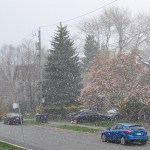Forecasting Using Yesterday’s Weather
When we talk about “forecasting using yesterday’s weather”, we mean that the most reliable prediction comes from using recent data, i.e. if you want to know how much a team can complete next sprint, look at how much they completed in the past few sprints.
 The recent weather in Toronto reminded me of a discussion I had with a Product Owner: “how can we use yesterday’s weather when what happened was unexpected and unlikely to happen again?” In the past week, the temperature here peaked at 31°C and three days later we had hail and snow. If we forecast next week’s weather using last week’s data, then should we expect to see both extremes again?
The recent weather in Toronto reminded me of a discussion I had with a Product Owner: “how can we use yesterday’s weather when what happened was unexpected and unlikely to happen again?” In the past week, the temperature here peaked at 31°C and three days later we had hail and snow. If we forecast next week’s weather using last week’s data, then should we expect to see both extremes again?
 Let’s review the PO’s question in this context: was last week’s high and low weather unexpected? Well, the short-term forecasts warned that both were coming. But even if one or both were unexpected, would it matter? It’s not like we expect weather forecasts to be 100% reliable – that would be unrealistic.
Let’s review the PO’s question in this context: was last week’s high and low weather unexpected? Well, the short-term forecasts warned that both were coming. But even if one or both were unexpected, would it matter? It’s not like we expect weather forecasts to be 100% reliable – that would be unrealistic.
Are those conditions unlikely to happen again? Well, that depends on your definition of “likely”. Will it definitely, 100% guaranteed, without fail, happen tomorrow – probably not. Will it happen again at some point in the future – probably. I’m still not willing to say yes or no because that’s not how forecasts work! Will we see both 30°C heat and snow tomorrow? I’m going to say that’s very unlikely, but I won’t go as far as 100% certainly no.
 So if we can’t give the PO an ironclad guarantee, why should we use “yesterday’s weather” when forecasting? Well, we could revert to asking the team for their estimates (which is usually an “educated guess” or just “gut feel”) and then tell them they have to meet the date which they supplied … but that’s not going to be a reliable forecast, and is likely to result in inflated estimates if the team feel they are being misused.
So if we can’t give the PO an ironclad guarantee, why should we use “yesterday’s weather” when forecasting? Well, we could revert to asking the team for their estimates (which is usually an “educated guess” or just “gut feel”) and then tell them they have to meet the date which they supplied … but that’s not going to be a reliable forecast, and is likely to result in inflated estimates if the team feel they are being misused.
 If we have to use forecasts, then using representative data is the best basis. We also need to understand probability, that asking for high confidence in an estimate means you’ll get a very conservative forecast. We also need to understand that the further ahead we try to forecast the more likely we are to be wrong; the best time to forecast the weather for 3pm tomorrow is at 2:59pm tomorrow.
If we have to use forecasts, then using representative data is the best basis. We also need to understand probability, that asking for high confidence in an estimate means you’ll get a very conservative forecast. We also need to understand that the further ahead we try to forecast the more likely we are to be wrong; the best time to forecast the weather for 3pm tomorrow is at 2:59pm tomorrow.
But most of all, we need to understand that forecasts are a guess – if we do it right it’s the most reliable prediction that we can make, but it’s still a guess – so don’t gamble more than you’re willing to lose and be prepared to adapt when reality takes an unexpected turn.


https://paulhenman.medium.com/forecasting-using-yesterdays-weather-ae89e86ce5fb